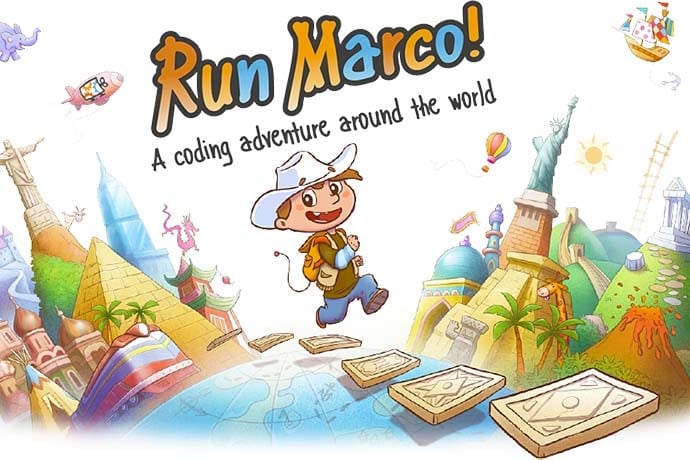Kids ages 5-8 obviously will not design and code software. However, they are old enough to be introduced to concepts in a fun way that may or may not lead to future exploration of programming and computer science. These coding options for kids ages 5-8 are listed from those that do not require computers — and can be played with family — to offline and online options for kids who want to work alone. Links are at the bottom of this article.
Board Games
For kids who enjoy group activities, especially with siblings and parents, there are a number of fun board games. Robot Turtles, for example, teaches basic programming concepts by letting kids draw cards then tell others what to do, as if they’re the programmer and others are the code.
Code Monkey Planet is by the same team that makes Robot Turtles. CodingFarmers has two modes for playing, a basic mode where kids learn by following instructions to complete tasks and a Java mode where instructions are written in Java.
Card Games
Card games work in a similar way as board games but in a more basic fashion. littleCodr, for example, lets you tell other players what to do. With Bits and Bytes kids try to get their program to Planet Ram and past evil bugs.
CS Unplugged
A great way to introduce kids to computer science is by ditching computers. Computer Science Unplugged is a free curriculum created by teachers and researchers for kids. Activities are hands on and make it easy for teachers and parents to engage kids in a learning dialogue. Materials are easily found at home or school.
Lauren Ipsum
This imaginative book explains computer science concepts in an often wacky way similar to Alice in Wonderland. Teachers, parents, and kids will have to stop and re-read the text to realize they’ve learned a key concept used in computer science and computing.
Computational Fairytales
Like Lauren Ipsum, the Computational Fairytales and Best Practices of Spell Design books present computer science ideas in a fun offbeat way almost anyone can grasp. A third book will be released in July 2016.
Online Coding Games
There are a number of online games that work within your web browser, for example, The Foos, Run Marco!, and Tynker. In addition to fun games, Tynker also has a full curriculum for elementary schools. Kids learn by playing through levels that become more difficult. Kids can stop when they feel comfortable.
Coding Apps
For kids who mostly like to work alone, Hopscotch, Move the Turtle, and similar apps are a fun way to figure out the basics of coding on their own, with the ability to ask others for help if they get stuck.
Learn More
Coding Board Games
http://thinkfun.com/robotturtles/
http://codemonkeyplanet.com/
http://mathandcoding.org/codingfarmers.html
Coding Card Games
http://bitsandbytes.cards/
http://littlecodr.com/
Computer Science (CS) Unplugged
Lauren Ipsum Book
https://nostarch.com/laurenipsum
Computational Fairytale Books
http://www.amazon.com/Computational-Fairy-Tales-Jeremy-Kubica/dp/1477550291/
http://www.amazon.com/Practices-Spell-Design-Jeremy-Kubica/dp/1481921916
https://www.nostarch.com/searchtale
Online Coding Games
https://www.tynker.com
http://thefoos.com
https://marco.allcancode.com
Coding Apps
http://movetheturtle.com
http://gethopscotch.com
http://bitsbox.com

